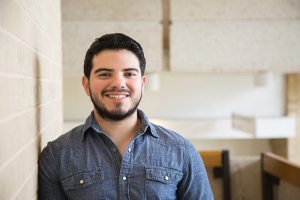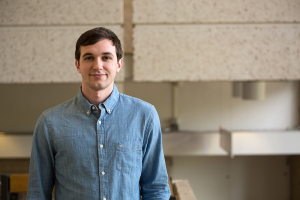Chemical and biomolecular engineering graduate student Ricardo Sosa earned the coveted National Science Foundation (NSF) 2016 Graduate Research Fellowship.
The NSF Graduate Research Fellowship Program (GRFP) is a highly competitive and prestigious award open to undergraduate seniors and graduate students pursuing research-based master’s and doctoral degrees in the STEM fields. It is the oldest graduate fellowship of its kind, and selected fellows receive an annual stipend for three years along with a tuition allowance and research and professional development opportunities.
Kyle Karinshak, a chemical engineering graduate student, received honorable mention for his application to the NSF GRFP. Honorable mention recipients are provided enhanced access to cyberinfrastructure resources, including supercomputing time, in support of research toward completion of the graduate program of study.
This year, the NSF received nearly 17,000 applications and made only 2,000 award offers to students from across the nation representing a diverse array of scientific disciplines.
Joan Ferrini-Mundy, assistant director for Education and Human Resources at the NSF, said that the GRFP is a vital part of the NSF’s efforts to foster and promote excellence in the STEM fields. "These awards are provided to individuals who have demonstrated their potential for significant research achievements, and they are investments that will help propel this country's future innovations and economic growth," she said.
Learn more about Ricardo Sosa and Kyle Karinshak below!
Ricardo Sosa — NSF GRF Recipient
Sosa, a native Houstonian, was first introduced to chemical engineering during his senior year of high school when Jeffrey Rimer, Ernest J. and Barbara M. Henley assistant professor of chemical and biomolecular engineering at the Cullen College, was invited to his AP research and design class. The presentation ignited Sosa’s interest in engineering and helped shape his future academic pursuits.
Sosa contacted Rimer the summer after his senior year of high school, which led to a position as a research assistant in Rimer’s lab during his first semester at the Cullen College. Since then, Sosa has worked with Rimer to explore surface science and intermolecular interactions in relation to kidney stone formation.
Sosa said he was drawn to the research in Rimer’s lab because of the interdisciplinary approach to engineering. “This project interested me because we are applying chemical engineering principles to the biomedical field,” he said.
Outside the lab, Sosa serves on the Outreach Committee for the UH American Institute of Chemical Engineers (AIChE) student chapter. As co-chair of the committee, Sosa has coordinated outreach events in local high schools to introduce students to STEM disciplines. He said he feels like he’s come full circle by sharing his experiences in order to encourage high school students to pursue engineering.
“I think it’s important to get high school students interested in the STEM fields,” he said. “When I was in high school, I didn’t fully understand what I was getting myself into [by studying engineering]. Now, I want to use my experiences to help make students aware and prepared.”
Sosa will begin his graduate chemical engineering studies at the Cullen College this fall.
Kyle Karinshak — NSF GRF Honorable Mention
Before pursuing his doctoral studies at the UH Cullen College of Engineering, Karinshak attended a Research Experience for Undergraduates (REU) program at the University of Houston, which provides undergraduate students the opportunity to conduct hands-on research under direct supervision of a faculty member. Karinshak spent the summer working alongside William Epling, professor of chemical and biomolecular engineering at the Cullen College, to study nanoparticle catalysts and their reactivity.
Karinshak said that although the research he conducted during the REU program was quite challenging, he was impressed with the guidance and advice provided by Epling. Karinshak now works in Epling’s lab exploring catalysis and reaction engineering, and is currently investigating the mechanism of sulfur poisoning in catalysis.
Karinshak also held a summer internship at NASA researching methods to improve the thermal propagation safety of space suit batteries. He said his REU experience was instrumental in securing his internship.
“I got the internship at NASA through contacts I made [at the Cullen College],” he said. “Being at the College has definitely opened up some interesting doors.”
Karinshak received his bachelor’s degree in chemical engineering from the University of Oklahoma and began his doctoral studies at UH in 2015.

